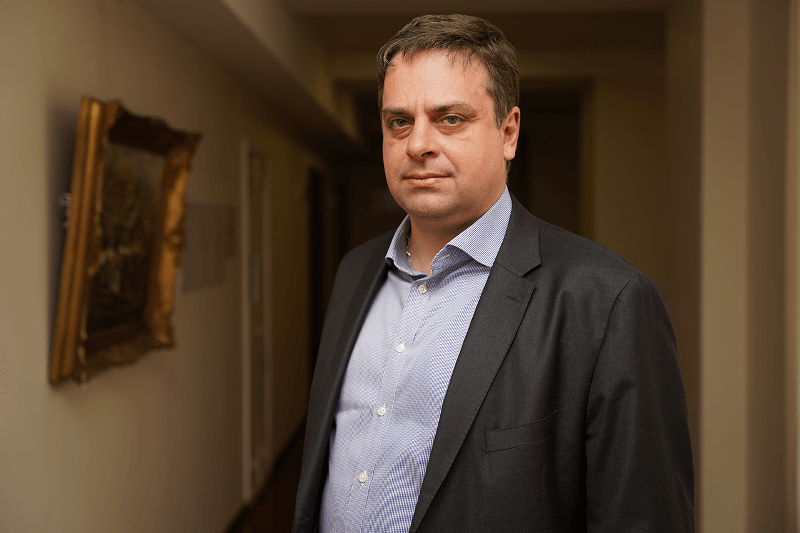Dmitro Los (foto), President of the Ukrainian Business & Trade association, describes in an interview with CursdeGuvernare how the Ukrainian economy is functioning during wartime, what difficulties companies face, and how they can be helped by the West to stay afloat, to be able to continue to pay their employees, as well as bills and taxes.
Dmitro Los also talks about what might come after the war, what investments Ukraine will need, and the opportunities it could be presented with after the end of this devastating war.
The International Monetary Fund (IMF) estimates that Ukraine’s economy could contract by up to 35%. The institution also warned, of the dangers to global food security, given that Ukraine is a major exporter of agricultural products.
***
CdG: How is the Ukrainian economy fairing given that it’s going through a war of a magnitude not seen in recent history in Europe?
We have daily contacts with our members in Ukraine. Everything is functioning. We are really happy to say that Ukraine is fighting, Ukraine is standing. On the one hand, it’s a huge disaster. We never thought that in this century somebody can do such a stupid thing in the middle of Europe. Somewhere in the back of everybody’s mind was the thought that this guy could go crazy.
The good thing is that there can never be any questions about the side Ukraine is on. There were a lot of talks about the fact that Ukraine is sympathetic to Russia. Now you can see that is not the case. People are dying for their European choice. Definitely, we think that Ukraine has to be granted member status for the European Union. The army is fighting and is quite successful. It is fighting the second largest army in the world and we are not losing, we are counter attacking.
Regarding civil society, everything is operational. Unfortunately we lost territories which are temporarily occupied, with severe damage to our economy. We are losing 50% of our GDP. Big enterprises were forced to shut down and this affects the economy, and people are losing jobs, and income.
There are a lot of internal refugees which moved to safer areas in western Ukraine. A lot of women and children left Ukraine.
CdG: How is the war impacting your workforce? Like you said, a lot of women have fled the country and many men are fighting in the army.
This is a problem for our members. Men went fighting and there are a lot of issues connected to this. We have a huge problem with logistics because drivers went to war. There is another big issue which is arising and we are talking to the Commission about it, we need to think about the future. Ukraine has a population of 38 million people and has always fed itself and has also supplied half of the world with agricultural products and food. The issue right now is that Ukrainian food producers have to work almost for free because they are giving their products to charity. We don’t have exports because ports are blocked and they need to give their products for free to the population to support the people who have difficulties.
The strange idea of charity organizations, we appreciate a lot what they are doing – but it is unreasonable to think that they will be able to feed 38 million people, given that we have a very smooth bottleneck to the European Union, only through Poland and Romania.
If those who produce food in Ukraine will stop because they are running out of liquidity, because they have no possibility to find liquidity, there will be pain. If there are no support programmes… like our organization is doing now, trying to explain that it is better to buy food from Ukrainian producers and bring it for free, especially because those producers know their clients, they have their own logistical distribution networks, than bring it from abroad.
The Commission and member states say everything is okay, but how about in one month? Millions will flee to the EU not because they are afraid, but because they will have nothing to eat.
CdG: I understand there are no major shortages right now but you estimate that things might look differently in one month?
Look, unfortunately, even during the war, you have to pay electricity, salaries, other procurements needed for your business and so on and then you give your products for free. It’s not a business model, it’s a charity model.
I spoke to United Nations representatives and they are all doing some crazy things. They are trying to help Ukraine by bringing blankets or chairs or tents from Qatar or Aman. Guys? Really? We produce everything in Ukraine. Buy it from them!
CdG: So the economy is running, people get their salaries, businesses produce goods, but most are given away for free. The problem is lack of capital?
Yes. The best way to support Ukraine right now, even in terms of charity organizations, is to buy aid not from Switzerland but from Ukraine.
Companies have their own delivery chains. You support them with capital, keep them running, keep paying salaries.
CdG: I understand that Lyov is a big industrial center in Ukraine, in the West. How much of the industry is in the area where fighting is going on?
Ukraine was an industrial-agricultural country so the agricultural part was almost not affected. In terms of heavy industry is a bit harder because some of our big factories, like Azovstal and others were hit by bombs. They had to shut down. In one to two months Ukraine will have used its steel and chemical reserves.
Much more important for the rest of the world are the food supply chains. Ukraine is the number one supplier of wheat to Egypt. We stopped the supply.
So there will be tension in the global market, and food prices will grow significantly.
CdG: Is the banking system still running? Is capital flowing throughout Ukraine?
Yes, everything is absolutely normal. Everything is running, I can use my card. IT, television, everything is working.
CdG: How about taxes? Are companies still paying taxes? I imagine the government needs funds to finance the war effort.
Yes, companies are still paying taxes. The government reduced the amount but we return to the problem we discussed. We also propose that banks and hedge-funds can help the Ukrainian companies with long term loans with minimal interest.
There are a lot of possibilities of how to help keep the Ukrainian economy running.
CdG: You proposed these solutions to the EU officials. We have some funds approved by the Commission for agriculture in Ukraine. Is more needed?
The Commission and the Parliament are more than supportive and they did an incredible job with the sanctions. The issue is that unfortunately they are still living in peaceful times and Ukraine is in the middle of the fight. The support is important and they are bringing what is needed, the money for Ukrainian producers of food but again, from political decisions the execution takes long periods of time.
What we need now is to speed up the process.
CdG: Cut bureaucracy?
I believe they are doing an enormous effort and we see their desire to help but bureaucracy works against us. We need to speed up procedures.
So most of the economy is still running but I imagine that is not true for the regions where the fighting is going on. Do you know how things are there?
Most of the population is trying to flee those areas but some simply cannot do it. People do not want to live under Russian occupations.
Not all can move, they have old parents, young children.
What Russians are doing in Mariupol to the civil population is homicide.
CdG: Beside the steel factory in Mariupol, do you know of any other facilities hit by bombs?
Yes, chemical factories. They are trying to attack logistical centers used for food. They are trying to bleed Ukraine, trying to starve people.
CdG: You said the war is costing 50% of the GDP. If it were to stop, how much investment will Ukraine need in order to rebuild?
Ukraine will need a Marshall Plan, more than 200 billion euro to rebuild everything. It is also a huge opportunity because we can create a brand new Ukraine.
After Ukraine will win the war we will be able to create a new country, on the highest standards with investment from all over the world.










